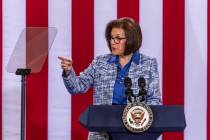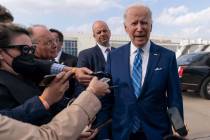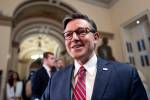The cost of health care reform
On the presidential campaign trail, in Washington and in state legislatures from coast to coast, everyone's talking about health care reform.
And by "reform," elected officials don't mean deregulation. Their proposals generally involve expanding government programs or creating new ones, requiring that citizens purchase health insurance and piling mandates on providers.
These pitches for wider coverage are popular -- until talk gets around to how to pay the bills.
California Gov. Arnold Schwarzenegger is the latest chief executive to take up the staggering political and fiscal challenge of putting a health care proposal into practice. Gov. Schwarzenegger wants the Golden State to follow the lead of Massachusetts, the first state to mandate that all residents obtain health insurance.
Hospitals and doctors' offices currently shift the costs of treating uninsured and low-income patients onto insured patients. This raises costs for insurance companies, forcing them to increase their premiums.
Gov. Schwarzenegger wants all California residents to share the costs of their medical bills. He envisions mandated health coverage, in the fashion that states mandate auto insurance for all car owners, as the best way to achieve that.
But that's a flawed analogy. People who don't own cars don't have to buy car insurance. So when Gov. Schwarzenegger says every Californian has to buy health insurance, it's not a mandate on individuals -- like car insurance. It's a mandate on taxpayers as a collective.
The Republican wants to offer subsidized coverage to the millions of households that make too much to qualify for Medicaid or other public health plans but are unable or unwilling to buy private health insurance. He says offering artificially discounted premiums to these folks will cost the state about $14 billion per year.
The Massachusetts model suggests the cost will be much higher. So many low- and middle-income households have signed up for subsidized coverage there that cost overruns could be in the hundreds of millions of dollars. Hundreds of thousands of healthy residents are still choosing to go without health insurance, leaving insurers with a largely unchanged risk pool. That's forcing companies to raise premiums again. The bill is already significantly higher than what was promised to Massachusetts taxpayers.
Democratic candidates for president are touting similar initiatives. Sen. Hillary Clinton and former Sen. John Edwards support mandating health insurance coverage for every resident. Sen. Barack Obama does not. All three want to expand government subsidies into the middle class to ensure that everyone can buy insurance. All three are promising the bills will be paid through tax increases on the rich.
All of these proposals are offered under a set of faulty assumptions. For starters, advocates of health care "reform" maintain there is a permanent underclass of uninsured Americans totaling more than 40 million people nationwide. In fact, that figure represents the approximate number of Americans who'll go without health insurance at some point during a given year. The pool of uninsured is constantly churning and includes millions of people who qualify for public assistance but do not enroll.
Additionally, politicians like to assume that people go without health insurance solely because they can't afford it. But the universal health care experiment in the state of Maine is proving that wrong. Three years after voters there approved a program to expand Medicaid eligibility and offer coverage to all residents, the state's percentage of uninsured was largely unchanged -- between 2003 and 2006, it dropped from 11.8 percent to 10.8 percent. A study by the Maine Heritage Policy Center found that young, healthy, single residents were much more likely to decide against buying coverage.
"The uninsured are trying to tell us something," Greg Scandlen, president of Maryland-based Consumers for Health Care Choices, told Health Care News. "Increasingly, we're seeing they're not low-income, indigenous people. That's an important signal we should not be ignoring."
Meanwhile, Maine taxpayers are out hundreds of millions of dollars over that period and facing tax increases because the program's cost exceeded projections.
Sound familiar? Gov. Schwarzenegger's plan is no cure. It's just another cost-shifting scheme. And whatever cost is advertised will likely be understated by millions -- or billions.























